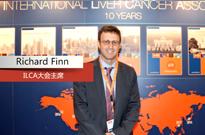
ILCA主席、美国加利福尼亚大学洛杉矶分校医学院Richard Finn教授
编者按:截止今年,ILCA年会已经召开了十届。ILCA是一个致力于肝癌研究的国际性组织,它涵盖了从肝脏病学到肿瘤学、从流行病学到分子诊断学、从基础研究到临床试验、从肝外科到肝移植,从介入治疗到靶向治疗的所有肝癌研究领域。ILCA由肝癌领域享有盛誉的专家、学者组成,希望通过每年举办一次国际性学术交流盛会来拓宽我们对肝癌的多学科认识。经过每一年的积累和努力,ILCA正在逐渐发展壮大。在本届大会上,本刊非常荣幸地邀请到本届,请他为本届大会进行回顾和总结。现将其内容整理成文,以飨读者。
《国际肝病》:在本届ILCA会上涌现出了一些大会亮点?
Finn教授:在肝癌治疗方面,有许多临床治疗手段的更新,值得一提的是,肝癌免疫治疗药物Nivolumab在治疗进展期肝癌患者中取得了显著的疗效,其结果非常令人振奋。另外,也有关于新一代小分子靶向治疗药物Regorafenib的最新研究进展,它的一项治疗索拉非尼失败的肝癌患者的III期临床试验取得了突破性进展,这也是近10年来首个获得阳性结果的III期临床试验。
在肝癌基础研究方面,法国学者通过对肝癌的组织病理学研究提出了肝癌分子学分型方案,该套方案将将为我们提供区分不同恶性程度的肝癌患者的依据。此外,我们很高兴地看到针对丙型肝炎已经研发出具有高效的直接作用抗病毒药物(DAAs), 90%以上的丙型肝炎患者将有望治愈。然而,一个仍未解决的问题是:对于HCV感染的肝癌患者,DAAs将有何作用?有关DAAs治疗是否可以影响肝癌患者的复发风险,目前仍存在一些争议。一些小样本的研究提示,从短期来看,DAAs治疗可能增加这部分肝癌患者复发的风险;然而一些较大样本的研究则表明,情况可能并非如此。因此,这将是未来有待深入研究的方向。
除此之外,在本届ILCA年会之前的会前会上,我们召开了一个关于“肝癌临床前研究”的主题研讨会。这是一项有关基础研究如何向临床应用转化的重要课题,这也是ILCA办会的宗旨所在:连接科学与应用的纽带,促进基础向临床的转化!
Dr. Finn: So, this year represents the 10th annual conference of ILCA (International Liver Cancer Association). ILCA is a global organization dedicated to liver cancer research. It engages not only one specialty, but all the specialties involved in liver cancer research. That includes: cancer medicine or oncology, hepatology, surgery, transplant, interventional radiology, as well as the scientists involved in liver cancer research. There are physician (Ph.D.) scientists that are working at the bench and it’s a great venue for interaction among all these people involved in liver cancer. The real hope of ILCA is to broaden our knowledge of liver cancer by bringing all these experts together over a few days in a meeting that is really multinational and multidisciplinary. You know, every year the meeting seems to be growing. We’re very excited to be here in Vancouver this year, where we’ve heard some very interesting presentations over the course of the past few days. On one side, we had an update on the clinical therapeutics being evaluated in liver cancer. There’s a lot of excitement about immunotherapy with Nivolumab being evaluated in advanced liver cancer. We heard at one of the symposiums an update on some of the data with regorafenib. Regorafenib is a small molecule inhibitor that has now shown to be active in a Phase III study after sorafenib. That’s a very significant finding; it’s the first new drug to show activity in a Phase III study for about ten years. We have heard some interesting scientific presentations. There was some data from the French group that looked at overlying histopathology from liver cancer with the molecular classification scheme, and identifying what the real underpinnings are at the molecular level behind terms like well-differentiated or poorly-differentiated. We’ve been very excited to see now some early data about the impact of the new direct antiviral agents being used for hepatitis C. As we know, these drugs are amazingly active, essentially curing hepatitis C in well over 90% of the patients who get them. But one of the unresolved questions is: what is the impact of clearing hepatitis C in patients who have liver cancer? There’s been some controversy-which we heard about here- about whether or not treating patients with these agents might affect their liver cancer recurrence risk. Some small studies suggest that, in the short term, they increase the risk of recurrence, but larger studies suggest that that might not really be there. So that’s an area that will need further study. But it’s been a very well-attended liver cancer meeting, ILCA. We had a preconference workshop this year on preclinical models, an area that is at the hub of translational research. You know, one of the goals of ILCA is to bring the science to the clinic, and from the bench to the bedside-and this workshop really focused on that.
《国际肝病》:肝癌治疗的主要困难是如何对患者分层。目前,在寻找可帮助确立患者亚型的分子学标志物上有何进展,最终实现肝癌的个体化治疗?
Finn教授:这是一个非常好的问题,也和我们的会议内容密切相关。我们知道,在肝癌研究领域仍有许多有待解决的临床需求或问题。肝癌在临床上也许称为一类疾病,然而事实并非如此。首先,患者可能同时兼有两种疾病--肝病和肿瘤;其次,在分子学水平,肝癌是一种具有异质性很高的疾病,这一理论至少已有10年之久!多年以前,一些研究通过生物芯片分析发现,肝癌患者中其实存在几个分子亚型。然而临床上,肝癌患者的治疗并不像其他肿瘤已经细化到可根据不同的肿瘤亚型来进行治疗。由此可见,在肝癌领域我们的基础研究和临床应用存在着严重的脱节。
近年来,我们在肝癌的个体化治疗上有了较大的进展。目前有几项III期临床研究正在进行当中。其中,一项是有关tivantinib用于Met阳性肝癌患者的二线治疗研究,tivantinib是一种针对c-Met和HGFR的靶向抑制剂,该研究通过筛查出Met高表达的肝癌患者进行治疗。如果该项研究获得了阳性结果,这将是分子学标志物用于肝癌分型的首个应用。另一项有关ramucirumab治疗的一项安慰剂对照临床试验已经展开,ramucirumab是VEGF的单克隆抗体,研究将筛选出针对AFP高表达(>400μg/L) 的肝癌患者接受治疗。
除此之外,一些有关利用分子分型筛选合适患者的早期临床试验正在开展。例如,临床前研究发现FGF19是一种新的HCC致癌基因,一项对于FGF19高表达的患者给予FGFR-4抑制剂治疗的临床研究正在进行。同时,还有关于利用CAR-T细胞技术进行肝癌免疫治疗的相关研究。
综上所述,正是在经历了多少次失败之后,我们终于迎来了肝癌分子分型和精准治疗的较大进展,这将为肝癌治疗提供更多的治疗选择。
Dr. Finn: Yes, it’s an excellent question, and that relates to the workshop. You know, the workshop recognizes that there are a lot of unmet needs in liver cancer research. Liver cancer, clinically, is still approached as one disease. We know it’s not one disease; we know, clinically, it’s two diseases: it’s liver disease and cancer. But we also know it’s not one disease because it’s very molecularly diverse. And that’s been known for well over a decade-some of the very early microarray profiling studies had identified that liver cancer actually exists as several distinct subtypes. But unlike other cancers we treat, the connection of that molecular diversity into the clinical trial design or patient selection markers, there’s been a big gap. Things are getting better. You know, we are trying to get the right drug to the right patient.
There are several Phase III studies that are ongoing that will try to answer that. There’s a second line study with tivantinib, an inhibitor of c-Met or the hepatocyte growth factor receptor. That study enrolled patients who only had high c-Met expression. So that’s a subpopulation, that’s a targeted population. If that study is positive, it will be one of the first validations of this personalized approach. The other study that is ongoing is with ramucirumab, selecting patients who have a high alpha fetoprotein. A high AFP looks to be a group of patients who might be the ones who get a benefit from ramucirumab, which is a monoclonal antibody to the vascular endothelial growth factor, or VEGF. And then there are things earlier in development. There are now molecules that target the fibroblast growth factor receptor 4-specifically FGFR4-and that’s based on data that we were involved with early on identifying that FGF19 amplification might be important in liver cancer and a biomarker for response. And then also at this meeting, we saw some interesting science involving the now clinical study design of a new immunotherapy using T cell receptor engineered against alpha fetoprotein. So, there’s a lot of movement towards personalized medicine and stratification based on molecular characteristics, and that’s really being driven by the fact that we’ve had so many disappointments in liver cancer when we do not take that into consideration.